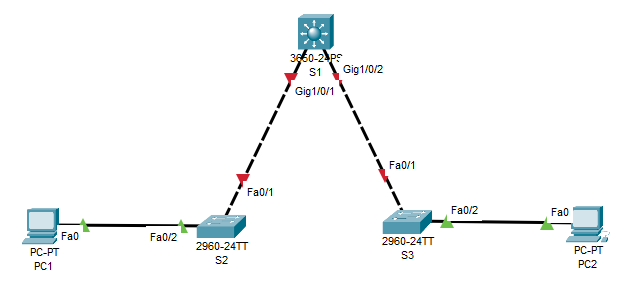思科SVI配置
说明
SVI技术与单臂路由和传统VLAN间路由一样,都是解决多个VLAN间通信问题。
SVI技术利用了多层交换机(本文以三层交换机为例)。
示例拓扑

其中S1为三层交换机
S2的Fa0/2接口于VLAN 10下
S3的Fa0/2接口于VLAN 20下
PC 1地址为192.168.10.2/24,默认网关为192.168.10.1
PC 2地址为192.168.20.2/24,默认网关为192.168.20.1
配置
二层交换机配置
首先创建划分VLAN:
S2的Fa0/2接口于VLAN 10下
S2(config)#vlan 10
S2(config-vlan)#name PC1
S2(config-vlan)#exit
S2(config)#interface f0/2
S2(config-if)#no shutdown
S2(config-if)#switchport mode access
S2(config-if)#switchport access vlan 10
S2(config-if)#exitS3的Fa0/2接口于VLAN 20下
S3(config)#vlan 20
S3(config-vlan)#name PC2
S3(config-vlan)#exit
S3(config)#interface f0/2
S3(config-if)#switchport mode access
S3(config-if)#switchport access vlan 20
S3(config-if)#no shutdown
S3(config-if)#exit配置Trunk端口:
分别对S2和S3的Fa0/1端口进行配置
S2(config)#interface f0/1
S2(config-if)#switchport mode trunk
S2(config-if)#exit
S3(config)#interface f0/1
S3(config-if)#switchport mode trunk
S3(config-if)#exit三层交换机配置
同样在S1中创建相应的VLAN:
(注意,思科模拟器中需要双击3650三层交换机拖动电源模块才能启动它)
S1(config)#vlan 10
S1(config-vlan)#vlan 20
S1(config-vlan)#exit给VLAN配置IPv4地址:
其中VLAN 10地址为192.168.10.1/24
VLAN 20地址为192.168.20.1/24
S1(config)#interface vlan 10
S1(config-if)#no shutdown
S1(config-if)#ip address 192.168.10.1 255.255.255.0
S1(config-if)#exit
S1(config)#interface vlan 20
S1(config-if)#no shutdown
S1(config-if)#ip address 192.168.20.1 255.255.255.0
S1(config-if)#exit开启三层功能:
这一步很重要
S1(config)#ip routing配置PC地址
PC 1地址为192.168.10.2/24,默认网关为192.168.10.1
PC 2地址为192.168.20.2/24,默认网关为192.168.20.1
在模拟器中配置步骤很简单,此处省略
验证
Ping
PC1终端中去分别Ping PC1的默认网关、PC2的默认网关以及PC2
PC1默认网关:
ping 192.168.10.1Reply from 192.168.10.1: bytes=32 time<1ms TTL=255
Reply from 192.168.10.1: bytes=32 time<1ms TTL=255
Reply from 192.168.10.1: bytes=32 time<1ms TTL=255
Reply from 192.168.10.1: bytes=32 time<1ms TTL=255
Ping statistics for 192.168.10.1:
Packets: Sent = 4, Received = 4, Lost = 0 (0% loss),
Approximate round trip times in milli-seconds:
Minimum = 0ms, Maximum = 0ms, Average = 0msPC2默认网关:
ping 192.168.20.1Pinging 192.168.20.1 with 32 bytes of data:
Reply from 192.168.20.1: bytes=32 time<1ms TTL=255
Reply from 192.168.20.1: bytes=32 time<1ms TTL=255
Reply from 192.168.20.1: bytes=32 time<1ms TTL=255
Reply from 192.168.20.1: bytes=32 time<1ms TTL=255
Ping statistics for 192.168.20.1:
Packets: Sent = 4, Received = 4, Lost = 0 (0% loss),
Approximate round trip times in milli-seconds:
Minimum = 0ms, Maximum = 0ms, Average = 0msPC2:
ping 192.168.20.2Pinging 192.168.20.2 with 32 bytes of data:
Request timed out.
Reply from 192.168.20.2: bytes=32 time<1ms TTL=127
Reply from 192.168.20.2: bytes=32 time<1ms TTL=127
Reply from 192.168.20.2: bytes=32 time<1ms TTL=127
Ping statistics for 192.168.20.2:
Packets: Sent = 4, Received = 3, Lost = 1 (25% loss),
Approximate round trip times in milli-seconds:
Minimum = 0ms, Maximum = 0ms, Average = 0msTracert
tracert 192.168.20.2Tracing route to 192.168.20.2 over a maximum of 30 hops:
1 0 ms 0 ms 0 ms 192.168.10.1
2 0 ms 0 ms 0 ms 192.168.20.2
Trace complete.